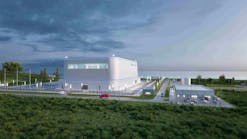An Idaho company which aspires to manufacture insulation and building materials from sustainably sourced hemp has opened a new energy-efficient plant in the state.
Hempitecture has opened its 33,000-square-foot manufacturing facility in Jerome, Idaho. The company, based in Ketchum, plans to produce nonwoven materials such as liners, insulation and more from hemp fiber.
The company broke ground on its project in 2021.
“We are proud to be building a company that not only makes healthy and sustainable products, but a company that values the importance of U.S. manufacturing, a developing U.S. supply chain and creates clean, ag-tech jobs for the region,” Hempitecture founder and CEO Mattie Mead said at the time of the October 2021 groundbreaking.
The new facility has a concrete core shell makeup and 32-foot ceilings to make it energy efficient. The manufacturing plant will utilize renewable energy contracted from utility Idaho Power’s Green Power program, including hydro, solar and wind.
Hempitecture has partnered with the University of Idaho to research the potential development of its HempWool natural fiber insulation. Its building product Hempcrete is derived from limestone and woody core fiber from industrial hemp stalks.
“You know, we impose this built world on the natural world,” founder Mead said in an article about the company on the Idaho Department of Commerce website. “Yet there is this correlation: I was looking at different countries and what they are doing to create and manufacture next-generation building materials and, ultimately, I learned about industrial hemp rapidly renewable feedstock.”
Indeed, hemp grows quickly and is now more commercially viable since the 2018 Farm Bill removed it from the controlled substances list. A Texas startup, Bemp Research Corp., has been exploring the viability of hemp as an alternative to lithium ion in battery energy storage composition, including its B4C-hemp –Boron Carbide made from hemp lithium sulfur battery technology.
Another company, Generation Hemp, is developing a hemp biomass and solar power project to support operations in Bitcoin mining in Massachusetts
Since January 2022, a multitude of states has received federal approval for pursuing industrial-scale hemp production.
-- -- --
(Rod Walton, senior editor for EnergyTech, is a 15-year veteran of covering the energy industry both as a newspaper and trade journalist. He can be reached at [email protected]).
Follow us on Twitter @EnergyTechNews and @rodwaltonelp and on LinkedIn





